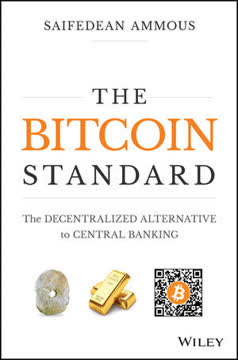Key Takeaways
1. Bitcoin emerges as a revolutionary digital currency, born from cypherpunk ideals
"Bitcoin and Tor are revolutionary and sites like Silk Road are just the beginning."
Satoshi Nakamoto's vision. In 2008, an anonymous figure using the pseudonym Satoshi Nakamoto introduced Bitcoin, a decentralized digital currency designed to operate without the need for banks or governments. Bitcoin's creation was rooted in cypherpunk ideology, which advocated for using cryptography to protect privacy and promote social change.
Key features of Bitcoin:
- Decentralized network with no central authority
- Limited supply of 21 million coins
- Transactions recorded on a public ledger called the blockchain
- Mining process to create new coins and verify transactions
- Use of cryptography for security and anonymity
Bitcoin's emergence coincided with growing distrust in traditional financial institutions following the 2008 financial crisis, making it attractive to those seeking alternatives to government-controlled currencies.
2. Early Bitcoin pioneers face challenges and setbacks in building infrastructure
"I try to remind myself that Bitcoin will probably collapse. As bullish as I am on it, I try to check myself and remind myself that new innovative things usually fail. Just as a sanity check."
Building from scratch. Early Bitcoin adopters like Hal Finney, Martti Malmi, and Gavin Andresen worked tirelessly to develop the necessary infrastructure for Bitcoin to function as a usable currency. They faced numerous technical challenges and skepticism from the broader tech community.
Key developments in Bitcoin's early days:
- Creation of the first Bitcoin wallets and mining software
- Establishment of online forums and communities for Bitcoin discussion
- Launch of early Bitcoin exchanges like Mt. Gox
- Development of merchant services to accept Bitcoin payments
Despite their enthusiasm, these pioneers recognized the experimental nature of Bitcoin and the possibility of failure. Their perseverance in the face of uncertainty laid the groundwork for Bitcoin's future growth and adoption.
3. Silk Road becomes Bitcoin's first killer app, raising ethical and legal questions
"If Bitcoin catches on in a big way, these are things we'll want to explore in the future, but they all had to be designed at the beginning to make sure they would be possible later."
The dark side of innovation. Silk Road, an online black market for drugs and other illicit goods, became Bitcoin's first widely-used application. Created by Ross Ulbricht under the pseudonym Dread Pirate Roberts, Silk Road demonstrated Bitcoin's potential for anonymous, censorship-resistant transactions.
Silk Road's impact on Bitcoin:
- Increased Bitcoin's visibility and usage
- Highlighted the currency's potential for illicit activities
- Attracted scrutiny from law enforcement and regulators
- Sparked debates about personal freedom and government control
While Silk Road's success boosted Bitcoin's adoption, it also tarnished its reputation and raised ethical concerns about the technology's potential for enabling criminal activity. The eventual shutdown of Silk Road and Ulbricht's arrest marked a turning point in Bitcoin's history, forcing the community to grapple with the implications of their creation.
4. Bitcoin gains mainstream attention, attracting investors and entrepreneurs
"It's either going to change everything, or nothing."
From fringe to mainstream. As Bitcoin's price began to rise and more people became aware of its potential, a new wave of entrepreneurs and investors entered the space. Companies like BitInstant, Coinbase, and Blockchain.info emerged to provide user-friendly services for buying, selling, and storing Bitcoin.
Notable developments in Bitcoin's growth:
- Venture capital firms begin investing in Bitcoin startups
- Mainstream media coverage increases, both positive and negative
- More merchants start accepting Bitcoin as payment
- Bitcoin ATMs appear in major cities worldwide
The influx of money and talent into the Bitcoin ecosystem accelerated its development and legitimacy. However, it also created tensions between the idealistic early adopters and the more profit-driven newcomers, leading to debates about Bitcoin's future direction.
5. Mt. Gox's collapse tests Bitcoin's resilience and highlights need for better security
"We are happy to see the government start regulating the Bitcoin exchanges."
A wake-up call. The collapse of Mt. Gox, once the world's largest Bitcoin exchange, in 2014 sent shockwaves through the Bitcoin community. The loss of hundreds of thousands of Bitcoins worth millions of dollars exposed the vulnerabilities in the existing infrastructure and the need for more robust security measures.
Lessons learned from the Mt. Gox debacle:
- Importance of proper security protocols for Bitcoin storage
- Need for transparency and accountability in Bitcoin businesses
- Risks of centralized exchanges in a decentralized ecosystem
- Resilience of Bitcoin's core protocol despite exchange failures
While the Mt. Gox collapse was a significant setback for Bitcoin, it ultimately led to improvements in security practices and the development of more reliable exchanges and wallet services. The incident also highlighted Bitcoin's ability to survive major crises, reinforcing believers' faith in the technology.
6. Regulatory scrutiny intensifies as Bitcoin's influence grows
"The community is hopeful the currency will remain outside the reach of any government."
Navigating legal gray areas. As Bitcoin gained popularity and value, governments and regulatory bodies began to take notice. The lack of clear regulations surrounding cryptocurrencies created uncertainty for businesses and users, leading to increased scrutiny and attempts to bring Bitcoin under existing financial frameworks.
Key regulatory developments:
- FinCEN issues guidance on virtual currencies
- New York proposes BitLicense regulations
- IRS classifies Bitcoin as property for tax purposes
- SEC begins scrutinizing Initial Coin Offerings (ICOs)
The Bitcoin community grappled with how to balance the desire for freedom from government control with the need for legitimacy and stability. Some embraced regulation as a path to mainstream adoption, while others saw it as a threat to Bitcoin's core principles.
7. Bitcoin evolves from fringe experiment to potential financial game-changer
"Bitcoin is the first time in five thousand years that we have something better than gold."
A new asset class emerges. As Bitcoin matured, its potential as a store of value and hedge against economic uncertainty became increasingly apparent. Institutional investors and financial professionals began to take Bitcoin seriously as a new asset class, comparing it to gold and other traditional safe-haven investments.
Factors driving Bitcoin's evolution:
- Increased liquidity and market depth
- Development of Bitcoin futures and derivatives markets
- Growing acceptance by traditional financial institutions
- Recognition of Bitcoin's potential in developing economies
The debate shifted from whether Bitcoin would survive to how it might reshape the global financial system. Proponents argued that Bitcoin could serve as a universal, borderless currency and a check on government monetary policy, while skeptics remained concerned about its volatility and potential for illicit use.
8. Blockchain technology emerges as a transformative force beyond cryptocurrency
"We see the intrinsic value of Bitcoin as the conduit in a new global crowd-funded open-source payment network."
Beyond Bitcoin. As Bitcoin gained traction, many began to recognize the potential of its underlying blockchain technology for applications beyond digital currency. The concept of a decentralized, tamper-proof ledger sparked innovation across various industries.
Potential applications of blockchain technology:
- Smart contracts for automated, trustless agreements
- Supply chain management and tracking
- Digital identity verification
- Decentralized finance (DeFi) applications
- Voting systems and government record-keeping
The rise of blockchain technology led to the creation of new cryptocurrencies and platforms like Ethereum, expanding the scope of the crypto ecosystem. This broader focus on blockchain helped legitimize the technology in the eyes of businesses and governments, even as debates continued about the future of Bitcoin itself.
Last updated:
FAQ
What's Digital Gold about?
- Bitcoin's Origins: Digital Gold by Nathaniel Popper explores the creation and rise of Bitcoin, initiated by the enigmatic Satoshi Nakamoto.
- Key Figures: It profiles influential individuals like Erik Voorhees, Wences Casares, and the Winklevoss twins, highlighting their roles in Bitcoin's development.
- Financial Impact: The book examines Bitcoin's challenge to traditional financial systems, especially post-2008 financial crisis, and its potential to decentralize currency.
Why should I read Digital Gold?
- Cryptocurrency Insights: The book offers a comprehensive understanding of Bitcoin's evolution, crucial for those interested in finance and technology.
- Real-World Implications: It discusses Bitcoin's use in both legitimate and illicit activities, providing a balanced view of its potential and risks.
- Engaging Storytelling: Popper's narrative combines personal stories with historical context, making complex topics accessible and engaging.
What are the key takeaways of Digital Gold?
- Decentralization: Bitcoin allows individuals to control their money without banks or governments, emphasizing the power of decentralization.
- Community and Ideology: The book highlights the strong community and ideological beliefs among early adopters who saw Bitcoin as a challenge to traditional power structures.
- Risks and Challenges: It underscores the risks of Bitcoin, such as hacking and regulatory scrutiny, essential for understanding its financial landscape.
What are the best quotes from Digital Gold and what do they mean?
- Dual Motivation: “It’s the first thing I know where you can both get rich and change the world.” This reflects the dual goals of wealth and societal impact among Bitcoin enthusiasts.
- Privacy Importance: “Privacy is necessary for an open society in the electronic age.” This underscores the importance of privacy in financial transactions, a core principle of cryptocurrencies.
- Careful Development: “The project needs to grow gradually so the software can be strengthened along the way.” This emphasizes the need for careful scaling to ensure Bitcoin's security and reliability.
Who is Satoshi Nakamoto and why is he important in Digital Gold?
- Mysterious Creator: Satoshi Nakamoto is the pseudonymous creator of Bitcoin, whose identity remains unknown.
- Bitcoin's Design: Nakamoto's white paper laid the foundation for Bitcoin's blockchain technology, ensuring transaction transparency and security.
- Global Impact: His creation sparked a global movement towards cryptocurrencies, influencing discussions on the future of money.
How did Bitcoin gain popularity according to Digital Gold?
- Post-Crisis Appeal: Bitcoin gained traction after the 2008 financial crisis as an alternative to failing traditional banking systems.
- Community Building: Early adopters formed a passionate community, promoting Bitcoin through forums and meetups.
- Media and Events: Media coverage and events like Bitcoin conferences elevated its profile, attracting new users and investors.
What role did Silk Road play in Bitcoin's history as described in Digital Gold?
- Illicit Marketplace: Silk Road was an online marketplace for illegal goods, using Bitcoin for transactions.
- Boosting Adoption: It significantly increased Bitcoin's visibility and usage, demonstrating its potential for anonymous transactions.
- Regulatory Attention: Silk Road attracted law enforcement scrutiny, leading to discussions on Bitcoin's implications for illegal activities.
What challenges did early Bitcoin entrepreneurs face in Digital Gold?
- Regulatory Uncertainty: Entrepreneurs like Charlie Shrem faced a landscape of regulatory uncertainty as governments struggled to classify Bitcoin.
- Security Risks: Hacking incidents, such as the Mt. Gox hack, highlighted vulnerabilities in Bitcoin exchanges.
- Market Volatility: Bitcoin's price volatility posed challenges for establishing stable business models.
How does Digital Gold explain the ideological motivations behind Bitcoin?
- Libertarian Principles: Many early supporters were motivated by libertarian ideals, seeking a currency outside government control.
- Empowerment: Bitcoin was seen as a tool for empowering individuals to control their finances.
- Community Collaboration: The collaborative nature of the Bitcoin community fostered a shared purpose among its members.
What is the significance of the Bitcoin Foundation mentioned in Digital Gold?
- Advocacy and Education: The foundation promoted Bitcoin and educated the public and policymakers about its benefits.
- Standardization: It aimed to create standards and best practices for Bitcoin businesses.
- Community Representation: The foundation served as a representative body for the Bitcoin community.
How does Digital Gold explain the concept of blockchain?
- Decentralized Ledger: Blockchain is described as a public ledger recording all Bitcoin transactions, ensuring transparency and security.
- Mining Process: Transactions are verified through mining, where computers solve complex problems to create new blocks.
- Broader Applications: The book suggests blockchain could revolutionize various industries by providing secure transaction methods.
How does Digital Gold address the future of Bitcoin?
- Mainstream Adoption: The book discusses efforts to integrate Bitcoin into mainstream finance through regulatory compliance.
- Technological Advancements: Continuous development could lead to greater scalability and usability.
- Cultural Shift: As awareness grows, a cultural shift towards cryptocurrency integration into everyday life may occur.
Review Summary
Digital Gold explores the origins and early history of Bitcoin through the stories of key figures involved. Readers praised Popper's engaging narrative style and ability to explain complex technical concepts. Many found it an entertaining and informative introduction to Bitcoin, though some wanted more technical details or felt it was already outdated. The book was commended for its balanced perspective on Bitcoin's potential and challenges. Several reviewers noted it reads like an exciting financial thriller, with colorful characters and dramatic events.
Similar Books










Download PDF
Download EPUB
.epub digital book format is ideal for reading ebooks on phones, tablets, and e-readers.






